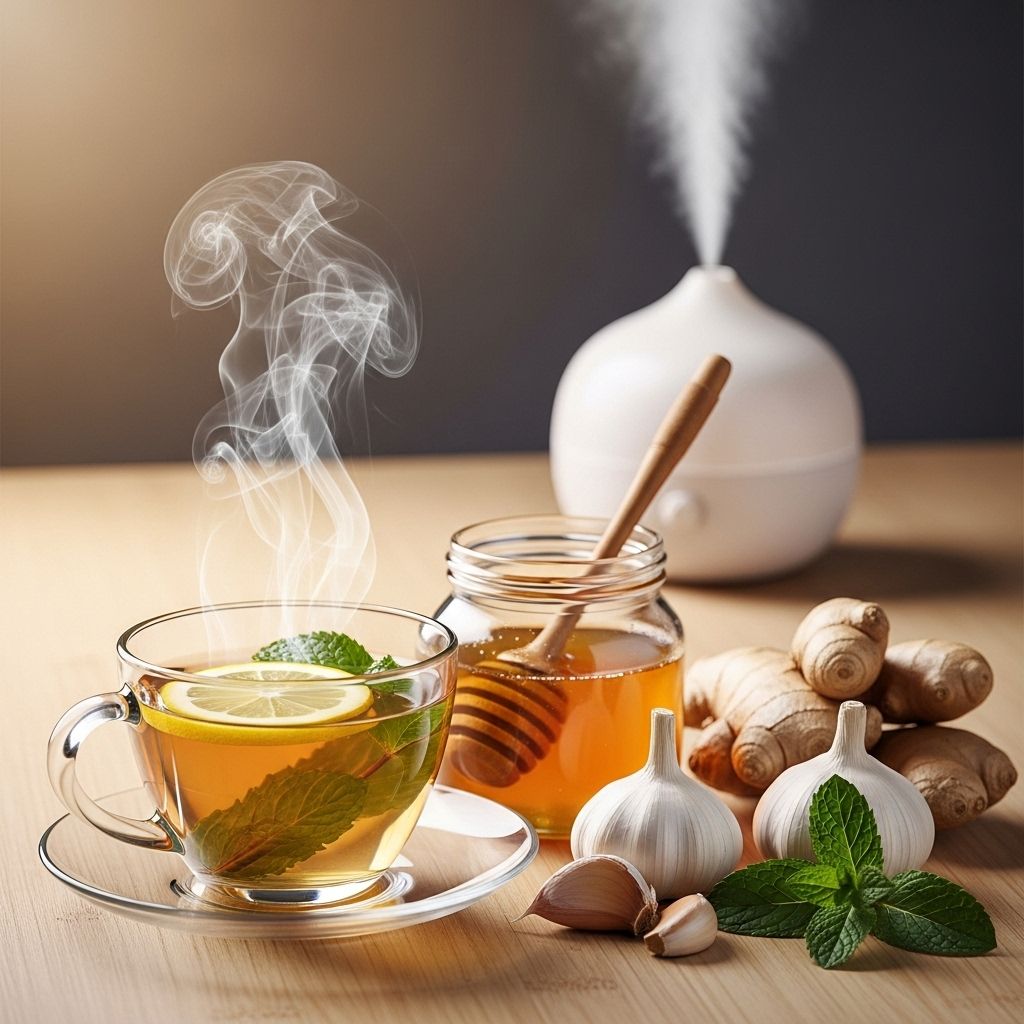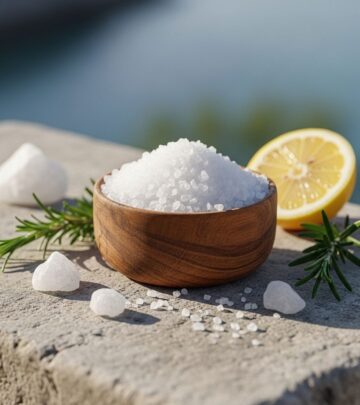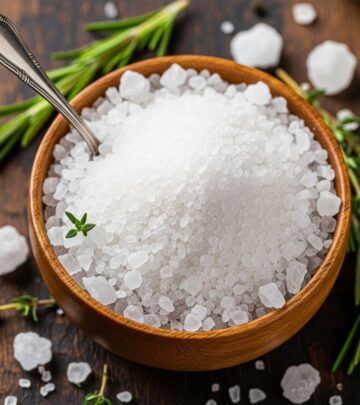12 Natural Home Remedies for Laryngitis Relief
Simple kitchen staples can soothe inflammation and help restore vocal strength.

Laryngitis, the inflammation of the voice box or larynx, can leave you feeling frustrated and uncomfortable with a hoarse or completely lost voice. This common condition affects millions of people worldwide and can result from viral infections, bacterial infections, overuse of the voice, or exposure to irritants. While medical treatment may be necessary for severe cases, many people find significant relief through natural home remedies that have been used for generations.
The larynx contains your vocal cords, which vibrate to produce sound when air passes through them. When these delicate structures become inflamed, swollen, or irritated, your voice becomes hoarse, weak, or may disappear entirely. Fortunately, nature provides us with numerous remedies that can help reduce inflammation, fight infection, and soothe the irritated tissues.
Understanding Laryngitis and Its Causes
Before diving into the remedies, it’s important to understand what causes laryngitis. The condition can be acute, lasting only a few days to weeks, or chronic, persisting for months. Common causes include viral infections like the common cold, bacterial infections, vocal strain from shouting or singing, acid reflux, allergies, and exposure to irritants such as smoke or chemicals.
Symptoms typically include hoarseness, weak voice, throat tickling, dry cough, and the sensation of needing to clear your throat frequently. While most cases resolve on their own, these natural remedies can significantly speed up the healing process and provide much-needed comfort.
Top 12 Natural Remedies for Laryngitis
1. Apple Cider Vinegar – Nature’s Antimicrobial Powerhouse
Apple cider vinegar stands out as one of the most effective natural remedies for laryngitis due to its potent antimicrobial properties. This versatile ingredient can help combat infections that may be causing your laryngitis while also providing anti-inflammatory benefits to reduce swelling in the voice box.
Preparation Method:
- Mix 2 tablespoons of apple cider vinegar with 1 teaspoon of honey in a glass of warm water
- Drink this solution slowly, allowing it to coat your throat
- Alternatively, dilute 1 tablespoon of ACV in warm water for gargling
Usage: Apply this remedy 2-3 times daily for optimal results. The acetic acid in apple cider vinegar creates an inhospitable environment for harmful bacteria and viruses while the honey provides additional soothing properties.
2. Fresh Ginger – Anti-inflammatory Root Medicine
Ginger has been revered for centuries as a powerful healing root, particularly for respiratory ailments. Its antimicrobial activities make it an excellent choice for treating throat infections that contribute to laryngitis. The active compounds in ginger, including gingerol and shogaol, provide both antimicrobial and anti-inflammatory benefits.
Preparation Method:
- Slice fresh ginger root into thin pieces
- Boil the ginger slices in water for 10 minutes
- Strain the liquid and allow it to cool to room temperature
- Consume one teaspoon of this decoction
Usage: Take this remedy 3-4 times daily. Fresh ginger is more potent than dried versions and provides maximum therapeutic benefits for laryngitis relief.
3. Aspirin Gargle – Pain Relief Solution
While not entirely natural, aspirin’s analgesic properties make it an effective remedy for laryngitis-related pain and discomfort. When used as a gargle, aspirin can provide targeted relief to the inflamed tissues of the larynx without systemic effects.
Preparation Method:
- Dissolve 1 aspirin tablet in 8 oz of warm water
- Gargle with this solution for 3-4 minutes
- Rinse your mouth thoroughly with plain water afterward
Usage: Use this gargle 2-3 times daily. Always rinse with plain water after use to prevent any residual effects on tooth enamel.
4. Honey and Lemon – The Classic Healing Duo
The combination of honey and lemon creates a powerful remedy that addresses multiple aspects of laryngitis. Honey possesses astringent properties that can soothe sore throat tissues, while lemon juice provides antimicrobial benefits to help clear throat infections.
Preparation Method:
- Mix 1 tablespoon of high-quality honey with 4-5 drops of fresh lemon juice
- Stir well until completely combined
- Consume this mixture slowly, allowing it to coat your throat
Usage: Take this remedy twice daily, preferably on an empty stomach for maximum absorption and effectiveness.
5. Steam Inhalation – Moisture Therapy
Steam inhalation provides immediate relief by adding moisture to the irritated laryngeal tissues. This simple yet effective method helps reduce inflammation, loosens mucus, and provides a soothing environment for healing.
Preparation Method:
- Boil water in a large pot
- Remove from heat and lean over the pot at a safe distance
- Cover your head with a towel to create a steam tent
- Inhale the steam slowly and deeply for 10-15 minutes
Enhancement Options: Add eucalyptus oil, peppermint oil, or chamomile tea to the water for additional therapeutic benefits.
6. Salt Water Gargle – Simple Yet Effective
Salt water gargling is one of the oldest and most trusted remedies for throat ailments. The salt helps reduce inflammation, draws out excess fluid from swollen tissues, and creates an environment that inhibits bacterial growth.
Preparation Method:
- Dissolve 1 teaspoon of sea salt in 1 cup of warm water
- Gargle with this solution for 30 seconds
- Spit out and repeat several times
Usage: Gargle 3-4 times daily, especially after meals and before bedtime.
7. Turmeric – Golden Anti-inflammatory Spice
Turmeric contains curcumin, a powerful anti-inflammatory compound that can help reduce laryngeal inflammation. Its antimicrobial properties also make it valuable for fighting infections that contribute to laryngitis.
Preparation Method:
- Mix 1 teaspoon of turmeric powder in a glass of warm milk
- Add a pinch of black pepper to enhance absorption
- Drink slowly before bedtime
Alternative Method: Create a paste with turmeric and honey for direct throat application.
8. Garlic – Natural Antibiotic
Garlic’s allicin content provides potent antimicrobial properties that can help combat the infections often responsible for laryngitis. This natural antibiotic has been used for centuries to treat respiratory ailments.
Preparation Method:
- Crush 2-3 fresh garlic cloves to release allicin
- Mix with honey to mask the strong taste
- Consume slowly, allowing the mixture to coat your throat
Usage: Take this remedy 2-3 times daily. Fresh garlic is more potent than processed forms.
9. Eucalyptus Essential Oil – Respiratory Relief
Eucalyptus essential oil provides excellent respiratory support and can help clear congestion associated with laryngitis. Its anti-inflammatory and antimicrobial properties make it a valuable addition to your natural remedy arsenal.
Preparation Method:
- Add 3-4 drops of eucalyptus oil to a bowl of hot water
- Inhale the steam for 10-15 minutes
- Alternatively, add to a diffuser in your bedroom
Safety Note: Never ingest eucalyptus oil directly and always dilute properly for external use.
10. Licorice Root – Traditional Throat Soother
Licorice root has been used for millennia to treat respiratory ailments. Its antimicrobial and antiviral properties make it particularly effective for laryngitis caused by infections[13]. The root also provides natural anti-inflammatory benefits.
Preparation Method:
- Boil 1 teaspoon of dried licorice root in 1-1.5 cups of water for 3-5 minutes
- Strain the liquid and allow to cool slightly
- Drink this herbal tea while warm
Usage: Consume 2-3 times daily. Important: Avoid this remedy if you have blood pressure issues or other major health conditions.
11. Mullein Herb – Anti-inflammatory Flower Power
Mullein herb possesses significant anti-inflammatory properties that can help reduce throat inflammation and soothe sore tissues[14]. This gentle herb has been traditionally used for various respiratory conditions.
Preparation Method:
- Steep 1-2 teaspoons of dried mullein flowers in 1 cup of boiling water for 10 minutes
- Strain the tea thoroughly to remove plant particles
- Drink slowly while warm
Usage: Consume 2-3 times daily for optimal anti-inflammatory benefits.
12. Slippery Elm – Nature’s Throat Coating
Slippery elm contains mucilage, a gel-like substance that creates a protective coating over irritated throat tissues[15]. This natural coating helps soothe inflammation and provides relief from the discomfort associated with laryngitis.
Preparation Method:
- Bring 1 cup of water to a boil
- Add 2 tablespoons of slippery elm bark
- Simmer for 10-12 minutes until a syrup-like consistency forms
- Take 1-2 tablespoons of this preparation
Usage: Use 2-3 times daily. Important: This remedy is not recommended for pregnant or breastfeeding women.
Additional Healing Strategies
Voice Rest and Vocal Hygiene
While natural remedies work to heal your larynx, it’s crucial to rest your voice as much as possible. Avoid whispering, which can actually strain your vocal cords more than normal speech. Instead, speak in a normal tone when necessary, or better yet, remain silent when possible.
Hydration and Environmental Factors
Maintaining proper hydration is essential for laryngitis recovery. Drink plenty of warm liquids throughout the day, avoid caffeine and alcohol which can be dehydrating, and use a humidifier to add moisture to your environment. Staying away from smoke and other irritants is equally important for faster healing.
When to Seek Medical Attention
While these natural remedies are generally safe and effective, certain symptoms warrant immediate medical attention. Consult a healthcare provider if you experience difficulty swallowing, breathing problems, high fever, blood in saliva, or if symptoms persist beyond two weeks. Chronic laryngitis may indicate underlying conditions that require professional treatment.
Prevention and Long-term Throat Health
Preventing future episodes of laryngitis involves maintaining good vocal hygiene, staying hydrated, avoiding known irritants, and managing conditions like acid reflux that can contribute to chronic inflammation. Regular hand washing and avoiding close contact with sick individuals can help prevent viral infections that lead to laryngitis.
Frequently Asked Questions (FAQs)
Q: How long does it typically take for laryngitis to heal using home remedies?
A: With consistent use of natural remedies and proper voice rest, acute laryngitis typically improves within 3-7 days. Viral laryngitis may take up to two weeks to completely resolve.
Q: Can I use multiple home remedies simultaneously for laryngitis?
A: Yes, many of these remedies complement each other well. However, introduce them gradually to monitor your body’s response and avoid any potential interactions.
Q: Are these remedies safe for children with laryngitis?
A: Most remedies like honey (for children over 1 year), ginger tea, and steam inhalation are safe for children. However, always consult with a pediatrician before giving any herbal remedies to children.
Q: Should I continue talking normally if I have laryngitis?
A: No, voice rest is crucial for recovery. Avoid talking unnecessarily, and when you must speak, use your normal voice rather than whispering, which can cause additional strain.
Q: Can acid reflux cause recurring laryngitis?
A: Yes, gastroesophageal reflux disease (GERD) is a common cause of chronic laryngitis. Managing acid reflux through diet and lifestyle changes can help prevent recurring episodes.
Natural remedies for laryngitis offer safe, effective alternatives to conventional medications for many people. These time-tested solutions work by addressing the root causes of inflammation and infection while providing soothing relief to irritated tissues. Remember to be patient with the healing process, maintain consistency with your chosen remedies, and don’t hesitate to seek professional medical advice when needed. With proper care and these natural interventions, your voice can return to its full strength and clarity.
References
- https://www.stylecraze.com/articles/effective-home-remedies-to-get-rid-of-laryngitis/
- https://www.healthylife.com.au/learn/laryngitis
- https://www.youtube.com/watch?v=1Dj6Jm5ESic
- https://www.webmd.com/first-aid/laryngitis-treatment
- https://www.health.harvard.edu/a_to_z/chronic-laryngitis-a-to-z
- https://southvalleyent.com/say-what-how-to-treat-short-term-laryngitis/
- https://www.mountsinai.org/health-library/diseases-conditions/laryngitis
- https://www.henryford.com/services/voice/vocal-cord/treatments/laryngitis
- https://www.templehealth.org/about/blog/how-to-protect-your-voice
- https://www.medicalnewstoday.com/articles/325748
Read full bio of medha deb












